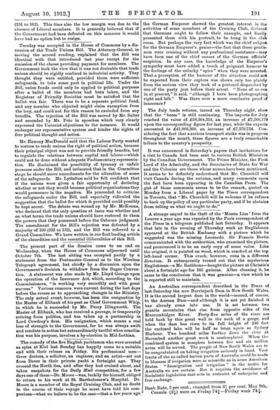Mr. Ramsay MacDonald said that the Labour Party wanted to
restore to trade unions the right of political action, because their principal object was not to provide friendly benefits, but to regulate the relations between capital and labour—which could not be done without adequate Parliamentary representa- tion. He disclaimed the possibility of tyranny or unfair pressure under the Bill, and intimated that in the Committee stage he should move amendments for the alteration of some of the safeguards. Mr. Lyttelton said be felt confident that if the unions were given a fair opportunity of declaring whether or not they would become political organizations they would pronounce in the negative. He proceeded to criticize the safeguards under the Bill, and especially ridiculed the suggestion that the ballot for which it provided could possibly he kept secret. The debate was wound up by Mr. McKenna, who declared that the only question at issue was whether and on what terms the trade unions should have restored to them the powers that they possessed before the Osborne judgment. The amendment for the Bill's rejection was defeated by a majority of 100 (232 to 132), and the Bill was referred to a Grand Committee. We have written in our first leading article of the absurdities and the essential illiberalities of this Bill.


































 Previous page
Previous page